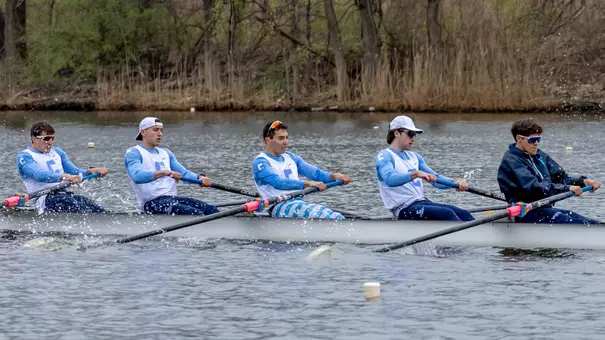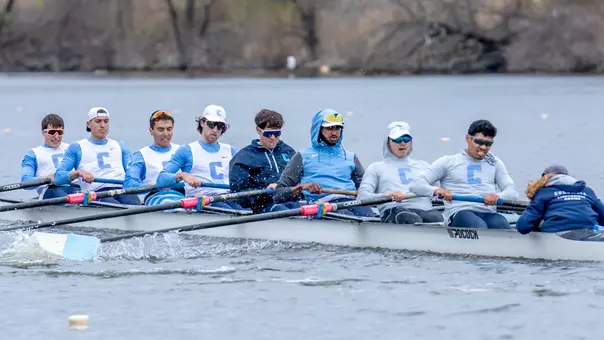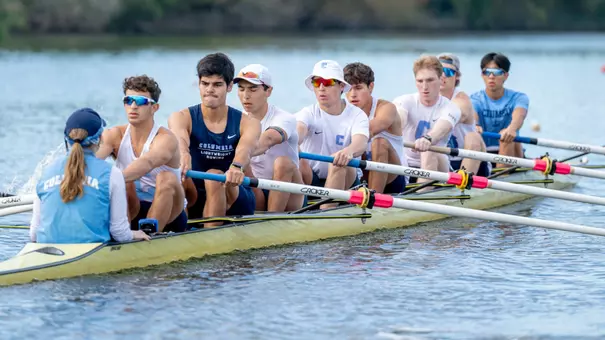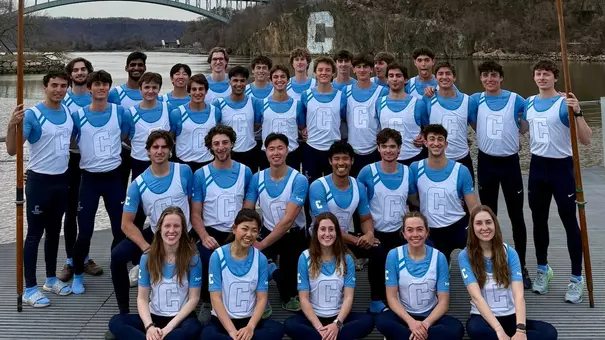From A Shattered Back To Olympic Glory
7/22/2021 12:00:00 PM | Lightweight Rowing, 2021 Olympians
Jakub Buczek '16CC broke his back ahead of his 2016 senior season, but the Columbia Lightweight Rower did not stop pushing his limits as he now prepares for the 2020 Tokyo Olympics.
TOKYO – The slopes of Wildcat Mountain had been running fast all day, on this chilly day in 2016, and with each run, it seemed that the mountain was opening itself up for even more speed.
Standing at the top of the course, Jakub Buczek '16CC, having already put several runs in his back pocket, looked to push his own limits once again.
Pushing his limits, something Buczek has not stopped doing, was the reason why, as he flew down the slope, he cracked 50 m.p.h.
At the bottom of the slope, seeing the satisfying speed he reached, Buczek began to coast out his run, "I don't remember how it happened exactly, but I fell hard at the bottom of the hill."
Over the next few days, Buczek drifted in and out of consciousness in the hospital… with a twisted trunk, and four snapped vertebrae.
Now, five years later, and half a world away, Buczek's days consist of trucking back-and-forth from the water to the Olympic Rowing Training Center as a member of the Canadian Men's Four crew set to compete at the 2020 Summer Olympics.
"So much had been sacrificed, with time away from family and loved ones," said Buczek. "But when I knew, I was going to the Olympics, it was just a huge sense of pride and relief. And, of course knowing that I was not done, I want gold."
His Columbia Lightweight Rowing crewmates know that mentality better than most, as before that fateful 2016 day on a mountain in New Hampshire, Buczek had not only become a leader of the Columbia Varsity Eight that had medaled the previous three years at the IRAs, finishing second in the nation in 2015, but he was considered to be the strongest rower in the Columbia Boathouse.
"Jakub was crushing it heading into his 2016 senior spring," said Columbia Lightweight Head Coach Nich Lee Parker. "He broke significant endurance records in the Columbia Boathouse, driving home how fit he was. But he was not alone as his group of seniors had been, together, looking to push the program's envelope further and 2016 was their year to win gold."
Three years of two bronze medals and one silver at the IRAs had meant that the 2016 spring season was one that Jakub had his eyes on. Until he didn't.
Rather quickly after the accident, Jakub's condition was determined serious enough to need an airlift to Boston and surgery on his back. Fusion spinal surgery, with six vertebrae being fused together, meant that Jakub would be able to walk again and get back on his feet.
He was worried about getting onto the water.
"Within a week or two after the surgery, I decided that I did not want to miss my spring semester, and that IRA gold was what I still wanted," said Buczek. "I was doing everything within my power to tell myself that I was going to recover in time to help the boat race for IRA gold.
"But by March, I was told that I wouldn't recover in time for the spring season. And that devastated me, since the goal of winning IRA gold was something I had been working towards for the past three years."
Had Buczek hung it up right there, then he wouldn't be rowing in Tokyo this summer. He also would not be wearing his 2016 IRA gold medal around his neck.
Because Buczek pushed his limits.
"I decided that I wanted to contribute in other ways, and if I couldn't be in the boat that wins IRA gold, I wanted my teammates to achieve that goal. I'm not sure how helpful I was, but I gave technical help where I could, and I tried to make every practice and to be there when things weren't going the best."
That spring season, Buczek was there, fused spine and all, every step of the way to make sure that the Lightweight Lions would take what they wanted.
"What Jakub did was that he was with me every step of the way," said Parker. "He was at every practice, and he played the same leadership role outside the boat as he did inside the boat. When we won IRA gold, Jakub was right next to me. He might not have been in that boat, but he was a part of the group of Lions that took gold that day."
Buczek might have felt a sense of relief, for his crewmates and for himself, "I would've been devastated if we finished second and I was not out there to help them", but seeing a medal winning boat, and not being in that boat lit a fire in Buczek that would lead him to Tokyo.
LITERALLY called the "Last Chance Regatta" and being held on The Rotsee in Lucerne, Switzerland, Canada's Men's Four had to finish either first or second to punch the final two tickets available to Tokyo. Taking place over the weekend of May 14-16, 2021, Buczek and his three crewmates knew what they had to do.
It had been a long couple of years for Buczek and his crew, after failing to qualify a Men's Eight for the Olympics, both in 2018 and 2019, which led to the Canadian National Team breaking up the Men's Eight and instead looking to qualify a Men's Four to Tokyo.
Much like before, Buczek might have had the odds stacked up, but to beat the odds he just needed to push the limits.
Sitting bow of his Four Man boat, Buczek and his crew crossed the line in second place, with a time of 6:07.84, qualifying for the games. "I wasn't sure how to react when I qualified at the Last Chance Regatta, I think I just started crying and I couldn't really process my emotions. But this was just another step towards the Olympics, and rather quickly I flipped the switch."
Another step towards the Olympics, the first step happening at those 2016 IRAs.
Shortly after graduating from Columbia College, and landing a job outside of Boston, Buczek began to get himself fit enough to join the Canadian National Team.
It was as hard as it sounds.
Every morning, starting that fall of 2016, Buczek would wake up and drive into Boston from his parent's suburb home and hit the Charles River at around 4:30 a.m. Then, after cleaning himself up, Buczek would make the 30-minute drive to Lexington, Massachusetts for work. After a long day in the office, Buczek would return to the Charles River for some more quality time with the famous waterfront.
He would then return home, rinse and repeat.
After a year of training to reach a level of fitness he felt he needed to be at, Buczek took yet another step towards the Olympics.
Buczek, after contacting the National Team, was paired up with another hopeful and his showcase began. "We got disqualified in that race, we went a bit too fast, and we ended up crashing the boat into the next lane," Buczek remembers. "But I had proven that I was fit enough to get the invite and my shot."
Quickly Buczek made the Canadian Men's Eight, but twice the boat failed to qualify for the Olympics, which is why the Canadian National Team broke the boat up. But Buczek was still in a top boat and after everything he had been through, the accomplishment was a satisfying one.
"I surprised myself by making that first Eight boat, and it felt great to even just be there. But my partner and I had showed our fitness and we had proven that we belonged in that boat.
"It was great to be in the boat with guys who I had looked up to when I was in high school, rowers who had raced in previous international competitions. Those few years rowing in that Men's Eight was just a remarkable experience and development for me as an international rower."
After crossing the line in second place, those mornings on the Charles River, trips to the physical therapist to keep his back in order, and a handful of summers missing the mark, Buczek was on his way to the Olympics.
Buczek will bring with him to Tokyo an IRA gold, a fused spine and the drive to never walk away, "you do everything for the team and the greater good of chasing that collective goal. Limits reached and passed mean nothing if you can't add those gains to your group of boatmates."
Buczek's next limit to reach and surpass is Olympic in stature.
Standing at the top of the course, Jakub Buczek '16CC, having already put several runs in his back pocket, looked to push his own limits once again.
Pushing his limits, something Buczek has not stopped doing, was the reason why, as he flew down the slope, he cracked 50 m.p.h.
At the bottom of the slope, seeing the satisfying speed he reached, Buczek began to coast out his run, "I don't remember how it happened exactly, but I fell hard at the bottom of the hill."
Over the next few days, Buczek drifted in and out of consciousness in the hospital… with a twisted trunk, and four snapped vertebrae.
Now, five years later, and half a world away, Buczek's days consist of trucking back-and-forth from the water to the Olympic Rowing Training Center as a member of the Canadian Men's Four crew set to compete at the 2020 Summer Olympics.
"So much had been sacrificed, with time away from family and loved ones," said Buczek. "But when I knew, I was going to the Olympics, it was just a huge sense of pride and relief. And, of course knowing that I was not done, I want gold."
His Columbia Lightweight Rowing crewmates know that mentality better than most, as before that fateful 2016 day on a mountain in New Hampshire, Buczek had not only become a leader of the Columbia Varsity Eight that had medaled the previous three years at the IRAs, finishing second in the nation in 2015, but he was considered to be the strongest rower in the Columbia Boathouse.
"Jakub was crushing it heading into his 2016 senior spring," said Columbia Lightweight Head Coach Nich Lee Parker. "He broke significant endurance records in the Columbia Boathouse, driving home how fit he was. But he was not alone as his group of seniors had been, together, looking to push the program's envelope further and 2016 was their year to win gold."
Three years of two bronze medals and one silver at the IRAs had meant that the 2016 spring season was one that Jakub had his eyes on. Until he didn't.
Rather quickly after the accident, Jakub's condition was determined serious enough to need an airlift to Boston and surgery on his back. Fusion spinal surgery, with six vertebrae being fused together, meant that Jakub would be able to walk again and get back on his feet.
He was worried about getting onto the water.
"Within a week or two after the surgery, I decided that I did not want to miss my spring semester, and that IRA gold was what I still wanted," said Buczek. "I was doing everything within my power to tell myself that I was going to recover in time to help the boat race for IRA gold.
"But by March, I was told that I wouldn't recover in time for the spring season. And that devastated me, since the goal of winning IRA gold was something I had been working towards for the past three years."
Had Buczek hung it up right there, then he wouldn't be rowing in Tokyo this summer. He also would not be wearing his 2016 IRA gold medal around his neck.
Because Buczek pushed his limits.
"I decided that I wanted to contribute in other ways, and if I couldn't be in the boat that wins IRA gold, I wanted my teammates to achieve that goal. I'm not sure how helpful I was, but I gave technical help where I could, and I tried to make every practice and to be there when things weren't going the best."
That spring season, Buczek was there, fused spine and all, every step of the way to make sure that the Lightweight Lions would take what they wanted.
"What Jakub did was that he was with me every step of the way," said Parker. "He was at every practice, and he played the same leadership role outside the boat as he did inside the boat. When we won IRA gold, Jakub was right next to me. He might not have been in that boat, but he was a part of the group of Lions that took gold that day."
Buczek might have felt a sense of relief, for his crewmates and for himself, "I would've been devastated if we finished second and I was not out there to help them", but seeing a medal winning boat, and not being in that boat lit a fire in Buczek that would lead him to Tokyo.
LITERALLY called the "Last Chance Regatta" and being held on The Rotsee in Lucerne, Switzerland, Canada's Men's Four had to finish either first or second to punch the final two tickets available to Tokyo. Taking place over the weekend of May 14-16, 2021, Buczek and his three crewmates knew what they had to do.
It had been a long couple of years for Buczek and his crew, after failing to qualify a Men's Eight for the Olympics, both in 2018 and 2019, which led to the Canadian National Team breaking up the Men's Eight and instead looking to qualify a Men's Four to Tokyo.
Much like before, Buczek might have had the odds stacked up, but to beat the odds he just needed to push the limits.
Sitting bow of his Four Man boat, Buczek and his crew crossed the line in second place, with a time of 6:07.84, qualifying for the games. "I wasn't sure how to react when I qualified at the Last Chance Regatta, I think I just started crying and I couldn't really process my emotions. But this was just another step towards the Olympics, and rather quickly I flipped the switch."
Another step towards the Olympics, the first step happening at those 2016 IRAs.
Shortly after graduating from Columbia College, and landing a job outside of Boston, Buczek began to get himself fit enough to join the Canadian National Team.
It was as hard as it sounds.
Every morning, starting that fall of 2016, Buczek would wake up and drive into Boston from his parent's suburb home and hit the Charles River at around 4:30 a.m. Then, after cleaning himself up, Buczek would make the 30-minute drive to Lexington, Massachusetts for work. After a long day in the office, Buczek would return to the Charles River for some more quality time with the famous waterfront.
He would then return home, rinse and repeat.
After a year of training to reach a level of fitness he felt he needed to be at, Buczek took yet another step towards the Olympics.
Buczek, after contacting the National Team, was paired up with another hopeful and his showcase began. "We got disqualified in that race, we went a bit too fast, and we ended up crashing the boat into the next lane," Buczek remembers. "But I had proven that I was fit enough to get the invite and my shot."
Quickly Buczek made the Canadian Men's Eight, but twice the boat failed to qualify for the Olympics, which is why the Canadian National Team broke the boat up. But Buczek was still in a top boat and after everything he had been through, the accomplishment was a satisfying one.
"I surprised myself by making that first Eight boat, and it felt great to even just be there. But my partner and I had showed our fitness and we had proven that we belonged in that boat.
"It was great to be in the boat with guys who I had looked up to when I was in high school, rowers who had raced in previous international competitions. Those few years rowing in that Men's Eight was just a remarkable experience and development for me as an international rower."
After crossing the line in second place, those mornings on the Charles River, trips to the physical therapist to keep his back in order, and a handful of summers missing the mark, Buczek was on his way to the Olympics.
Buczek will bring with him to Tokyo an IRA gold, a fused spine and the drive to never walk away, "you do everything for the team and the greater good of chasing that collective goal. Limits reached and passed mean nothing if you can't add those gains to your group of boatmates."
Buczek's next limit to reach and surpass is Olympic in stature.
Players Mentioned
Highlights: LAX | Columbia 19, Lafayette 10
Wednesday, February 18
Highlights: MBK | Columbia 75, Princeton 65
Saturday, February 14
Postgame: MBK | Thompson Talks Princeton Win
Saturday, February 14
Highlights: WBK | Columbia 69 - Penn 56
Saturday, February 14












